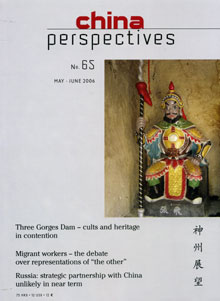
China Perspectives No. 65
- Special Feature
- Article
- Book Reviews
The Referendum Law 2003 in Taiwan: Not Yet the End of the Affair
This article argues that the Taiwan Referendum Law 2003 and the defence referendum held in 2004 raise a number of legal problems that deserve closer examination. It discusses the history of the Referendum Law from both legal and political viewpoints and argues that a functional and legitimate referendum must be carried out in compliance with the rule of law and the supremacy of the Constitution. The author identifies four main areas of concern, taking into account the Constitutional Amendment in 2005. First, the Referendum Law contained unconstitutional provisions that were not challenged before the defence referendum was held. Secondly, the Referendum Law should have expressly relied on the Constitution as its legal basis. Thirdly, the Referendum Law does not clearly determine the legal effects of the referendum. Fourthly, it does not contain adequate legal restraints on the President's power to call a defence referendum. These legal issues have been raised in politically oriented cases in the courts. This article, however, concludes that the initiative to rectify the legal problems of the Referendum Law should lie with the Legislative Yuan of Taiwan.
Interviews with Yang Jiang
Yang Jiang was born, under her real name of Yang Jikang, in 1911. She is the author of a novel, several plays, and a large number of sanwen. Her first writing dates back to 1933, and her latest work, Women sa (We Three), in which she recalls family memories, appeared in July 2003, and has been highly successful, with 180,000 copies sold within two months. However, for thirty years, from 1949 to 1981, for obvious reasons, Yang Jiang preferred to devote herself entirely to teaching, researchshe is also an expert on Chinese and foreign literature, and translation: she is the translator, most notably, of the Chinese version of Don Quixote. She is now devoting herself to the publication of the work of her husband, the scholar Qian Zhongshu (1910-1998). In France she is best known for her narratives of the Cultural Revolution, published by Christian Bourgois.
The two interviews that follow were carried out in 2005. Yang Jiang gave written answers to the questions I had sent her, which explains the slightly abrupt nature of our exchanges, given that it was not possible for me, by the nature of the interviews, to respond spontaneously to her words. If we seem to jump from one subject to another, it is because I had asked her to clarify certain details that I planned to use in my research into her work (« La Figure de l'intellectuel chez Yang Jiang » [The Intellectual in The Work of Yang Jiang], which became my doctoral thesis in Chinese Studies, under the direction of Isabelle Rabut, Inalco, Paris, December 2005, 404 p.). Yet, to me, these words of Yang Jiang are of interest just as they are, since she uses words so sparingly and generally refuses to do interviews. In any case, and I am grateful to her for this, she only allowed these words to be published precisely because she had written them herself.
The Three Gorges Dam ProjectReligious Practices and Heritage Conservation A study of cultural remains and local popular religion in the xian of Yunyang (municipality of Chongqing)
Yunyang, in the heart of the Three Gorges region, is bearing the brunt of the consequences of the dam’s construction, through the flooding of agricultural lands, the resettlement of families, the wholesale rebuilding of urban centres and the relocation of the famous Zhang Fei temple. At the core of vital economic, ideological and symbolic interests are historical and religious relics and the worship of local deities. From local development policies to citizen initiatives, these fundamental markers of community identity are the subject of many different investments and reworkings. They are showing themselves to be particularly crucial for consolidation of the identity of the inhabitants frayed by the trauma that the region is currently undergoing[1].
Debates and Classification Struggles Regarding the Representation of Migrants Workers
This article focuses on the ways in which migrants from the countryside were represented in the late 1980s and early 1990s, at a time when migration was becoming a major topic of public debate. Basing his argument on a close study of daily and weekly press articles, scientific journals, and reportage literature published between 1986 and 1991, he shows how a struggle has developed over the way the migratory movements are represented, and how it is articulated around an unresolved duality, namely the state and the market economy. The central issue in this controversy is the legitimacy of the migrants' presence in the towns, and this involves redefining the social and geographical hierarchy. The author also shows in historical terms how certain categories and labels like blind migrant have come into being; they participate in developing areas of state intervention.
Russia: No Strategic Partnership With China in View
This article offers a reflection on Russia's attitude towards possible alliances in Asia. There are numerous constraints, imposed by Russian domestic issues, and such collaborations could prove difficult. In view of this it is clear that there is little practical prospect of any real strategic partnership between Russia and China at the present time.
Fei-Ling Wang, Organizing through Division and Exclusion. China's Hukou System
Chih-jou Jay Chen, Transforming Rural China. How Local Institutions Shape Property Rights in China
Cheng Ying, Les Paysans de Mancang. Chronique d'un village taiwanais
Yanrui Wu, China's Economic Growth. A Miracle with Chinese Characteristics
Evelyne Micollier (ed.), Sexual Cultures in East Asia. The Social Construction of Sexuality and Sexual Risk in a Time of AIDS
S. Frederick Starr (ed.), Xinjiang. China's Muslim Borderland


